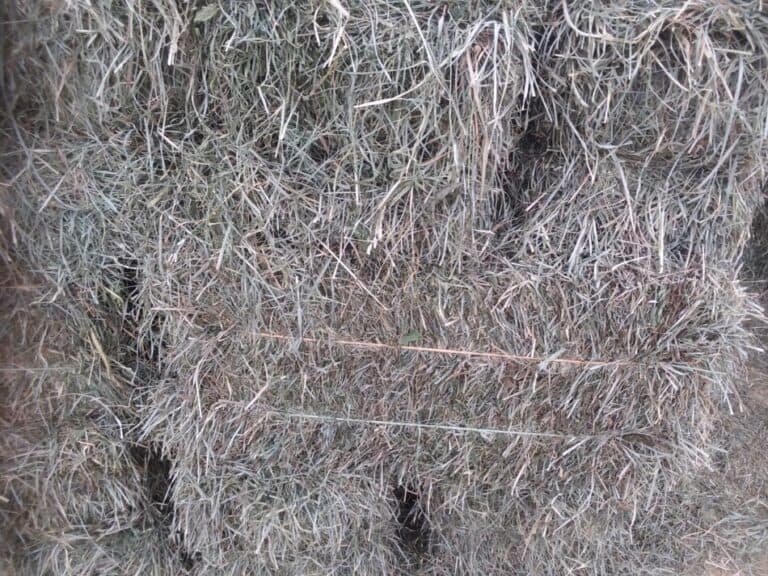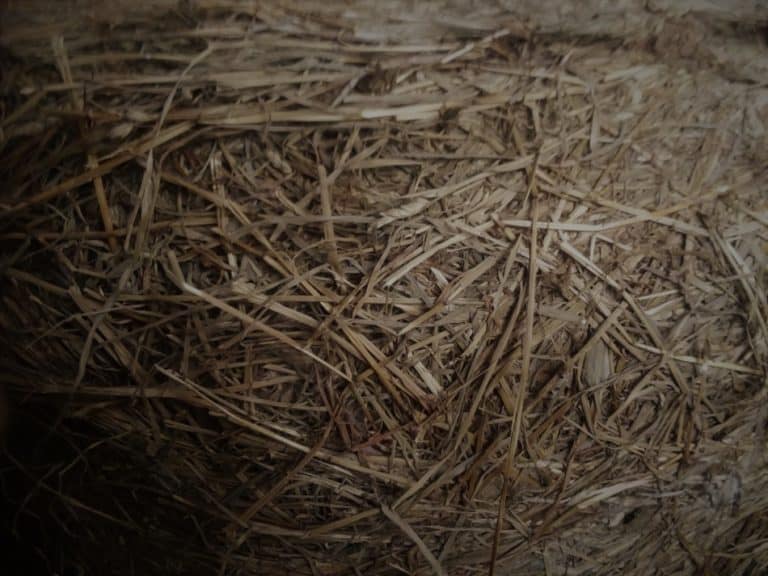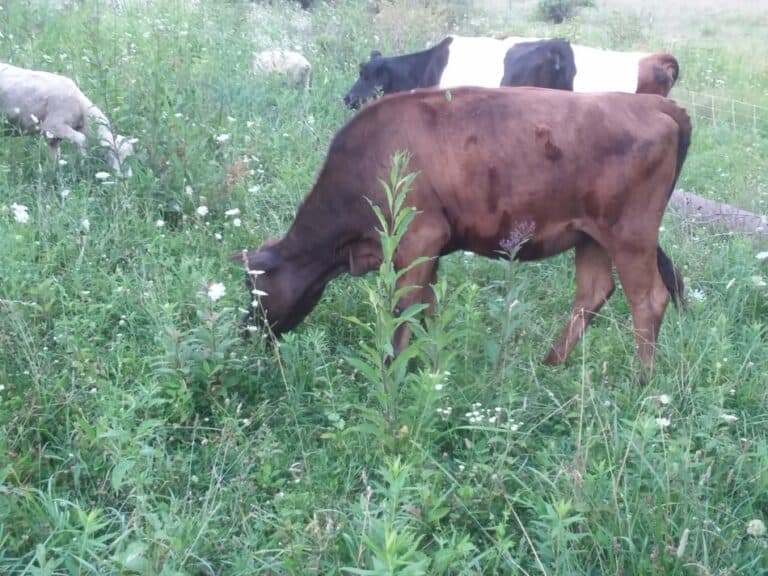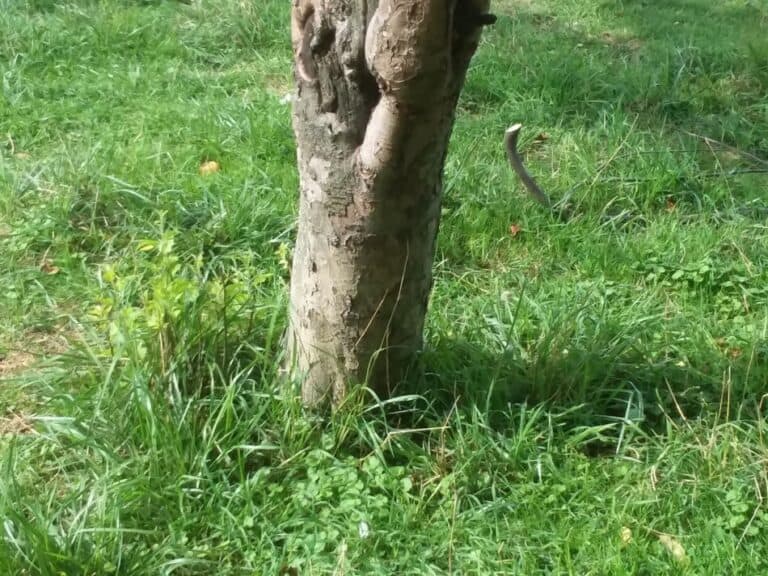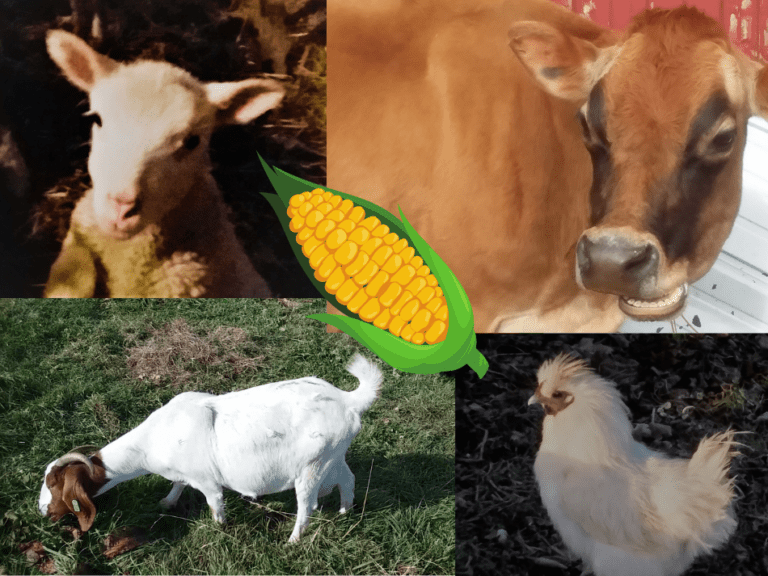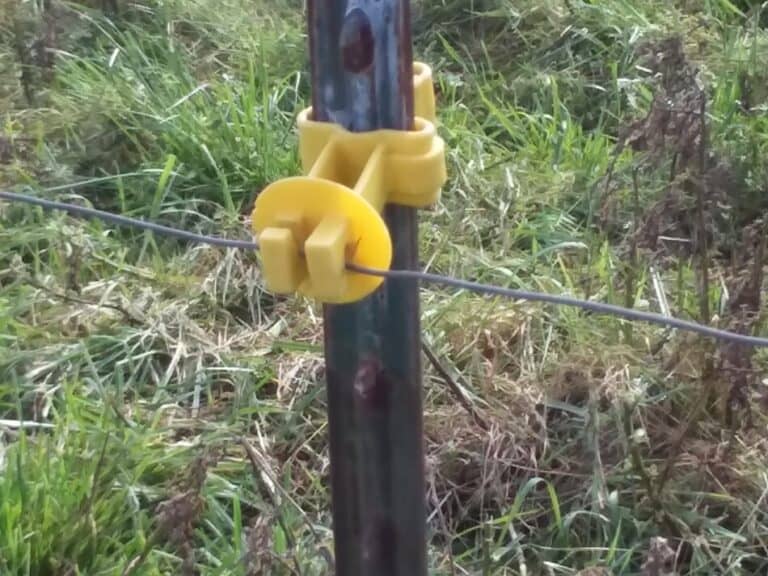4 Low Maintenance Farm Animals (Have A Life And Animals!)
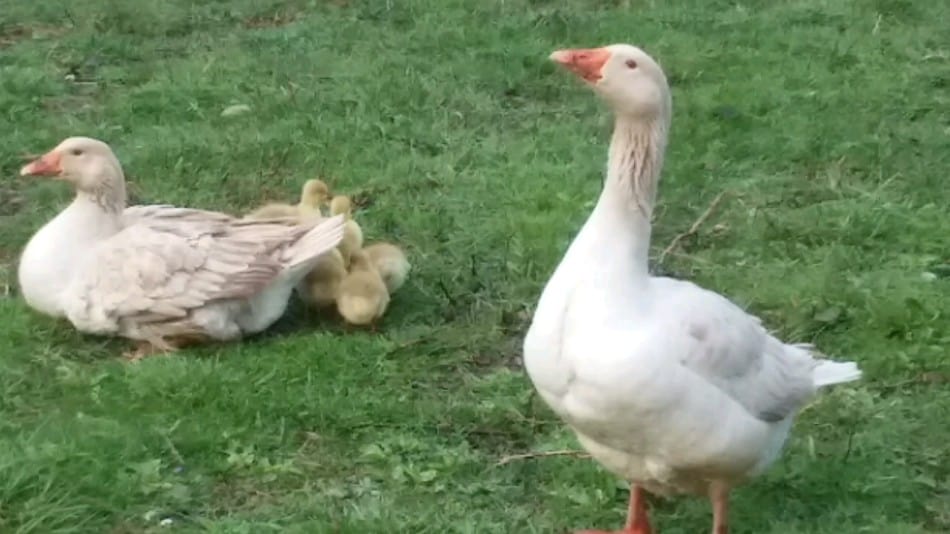
Looking to get some animals for your small farm, but don’t want to be stuck at home to take care of them?
Good news, here are some low maintenance farm animals that will be great for the on the go family that enjoys keeping a few animals around.
Low maintenance farm animals are:
- Barnyard chickens
- Geese
- Bees
- Grazers like cattle or sheep (if you have plenty of land)
Let me say first off, no animal will be completely hands off!
You will need to check in on them and have a friend or neighbor stop by when you are on vacation, but these are animals that you should be able to see if they are okay mostly with a quick look.
Interested in raising all of your family’s meat for the year? Read Meat For A Year, which will walk you through some options to find the meat animal combinations that will work for you.
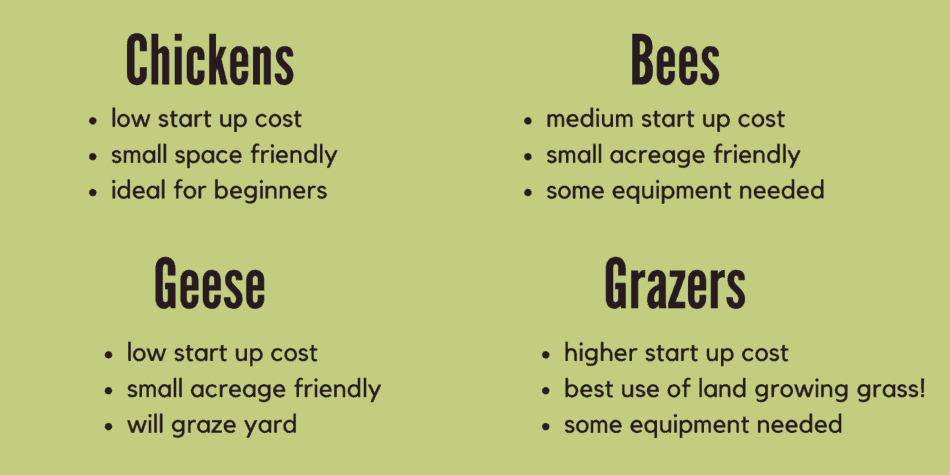
The second part to be aware of is that all baby or young animals need more care than when they are adults.
For example: if you decide to get a pair of geese, they will be very easy care and low maintenance when they are adults, but until they are full size they need some care from you.
Barnyard and backyard chickens are easy
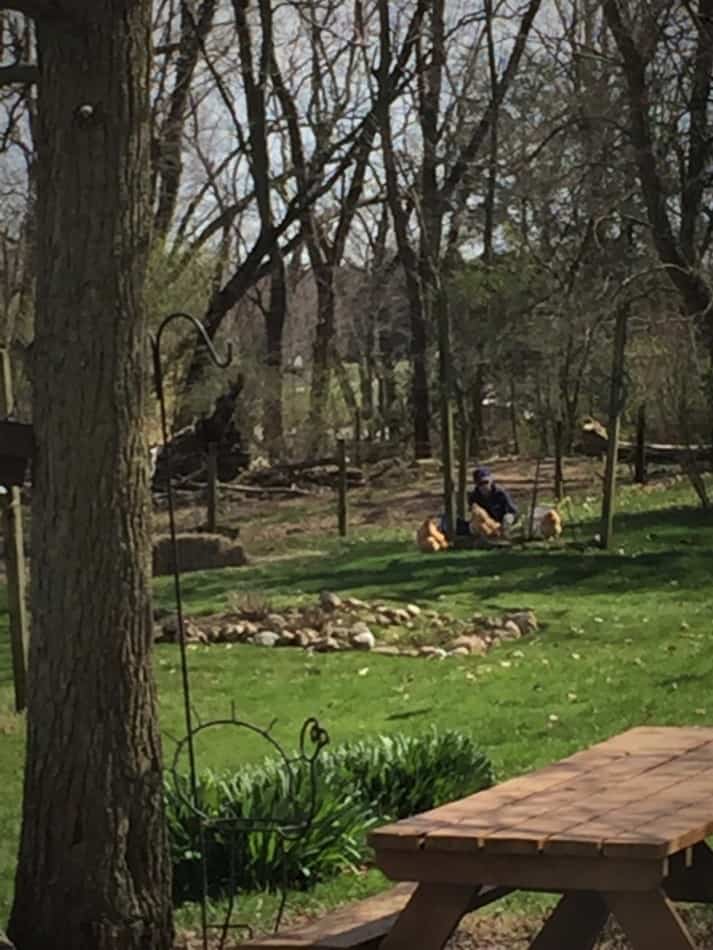
The reason I show you this picture is that the yard still looks nice (dispite having a few hens), and she and my dad like to travel. While they do have someone come and feed the chickens and other animals when they travel, having a few backyard animals does not keep them tied to the house at all!
If you are completely new to animals and are looking to get started look into chickens first!
What is the classic answer to low maintenance animals? Chickens! Whether you have a barnyard or backyard chickens are the place to start. Check out my article on 20 Calmest Chicken Breeds!
Why the whole hearted recommendation for beginning with chickens? Chickens are:
- easy to find, if not locally then online and shipped to you
- small bodied, meaning small feed needs and not intimidating
- they can be transported in a normal vehicle in a pet carrier, use one you already have one or borrow one.
Adult chickens are easy and very low maintenance, even in the winter!
If you get chicks, you’ll need to be willing to put in some work caring for them until they are full size. Start with adult birds if you need them to be low maintenance from day one.
Your chickens will only need a bit of feed, some water and a shelter from the harsher weather, specifically rain and wind. They do not seem to mind the cold, as long as they are not wet or in the path of the wind.
In the summer, chickens are even easier, since they can find a good portion of their dinner for themselves.
Need eggs? Feed layer mash
If you want your hens to be a reliable source of eggs for your family, you’ll want to feed a layer mash (mash is ground up feed).
Egg production takes lots of energy and will require more nutrition in the hen’s diet than she is likely to get from pecking around her pen, especially if she is a larger bodied chicken.
Give her more space and a bit of layer mash, so she has the energy to produce eggs for you.
What Is Laying Mash? goes into more detail about feeding your hens.
You have options when purchasing your chickens
You have a few options as far as getting chickens, you can order soon to lay pullets, get adult birds from a fellow chicken enthusiast or order chicks from the hatchery.
Ordering chicks: If you choose the chicks, your chickens will not be low maintenance until they are 6 months old or so.
Chicks need care and protection from predators along with a diet that allows for good growth.
If the chicks were with their mom, she would handle this, since you are functioning as the mom you will need to provide this care and attention until the chicks are adult size.
Once they used to be chicks are up to adult size, you now have the low maintenance birds you were hoping for.
Ready to lay pullets: Pullets are young female chickens that are not laying eggs yet.
These gals are going to be 4-5 months old and should start laying at 5.5-6 months of age.
Generally, the hatchery that you order these pullets from will have a few roosters of this age group as well if you want one.
The advantage of ready to lay pullets is you do not have to wait for full size birds, they will be nearly full size when you get them.
The down side is these birds will cost you more than if you bought the chick and raised it to this size yourself.
But if you want a hatchery purchased bird that is not ready to go, ready to lay pullets are a great choice.
Buying adult/mature chickens: You can buy adult chickens in a small starter flock, a trio would be a common choice here.
You can get as many chickens as you want, keeping in mind your space available to them and how much feed you want to buy.
If you want to get a very specific looking chicken, buying adults is the way to go.
Get birds from a breeder who focuses on the type of chickens you want to raise, the big differences are generally between show quality and utility (working type) genetics.
Stick with utility birds if you want low maintenance.
Murray McMurray Hatchery has a great site and really good chicken breed descriptions, including eggs per week, size and color of eggs and weights of the adult birds.
Geese are low maintenance birds
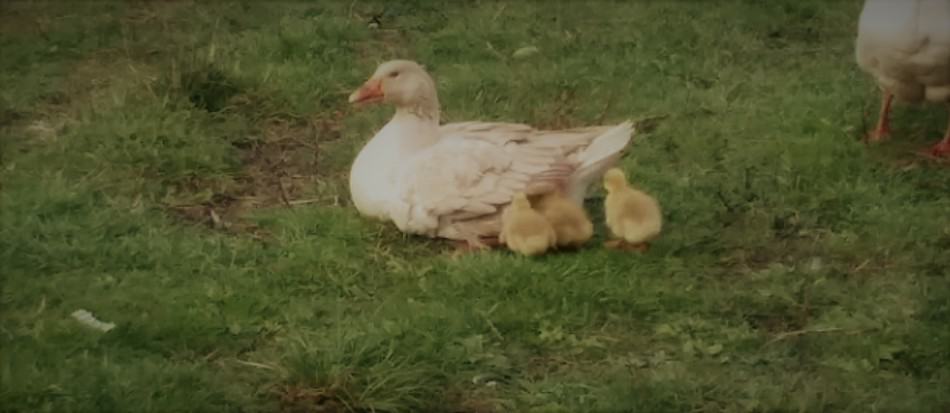
Geese are very low maintenance, once they are grown, of course! Our geese do their own thing most of the year, and really only need us when all the grass is covered with snow or ice in the winter.
Are Geese Easy To Raise? will walk you through the benefits and challenges of raising your own geese.
They love to get their own dinner and only count on us when mother nature keeps them from grazing.
Even then they really just need a scattering of grain and to make sure there is some open, not frozen, water for them to drink. That’s it!
Geese need only minimal shelter
Geese don’t get bothered by the weather much, hot or cold, as long as they have a sheltered spot to retreat too when they get the notion!
Even a shelter the size of a dog house would be fine for a pair of geese as long as you have bedding in the shelter, it is placed on high ground, so it’s not wet inside and it is oriented to keep out the wind.
If you notice your geese sitting outside instead of spending time in the shelter, don’t worry! Geese love to be outside and will go into the shelter when they think they need to.
Your geese will have a daily routine
Our geese have a routine that includes going out to the pasture to eat everyday and messing around in the creek whenever they want to.
There is no pond for them, which is fine as long as they have access to plentiful water.
When they are done eating for the day, they file back to the barnyard all in one group. They usually sleep in the barn then go out to eat again the next day.
The routine changes a bit in the spring, with the geese pairing up for breeding. Now they all still go out to get grass, but remain in the pairs or trios all day.
When a goose decides to build a nest and lay eggs, what does she need from you? Have some loose bedding material like straw or old hay for her to use and that’s it.
Just give her space and don’t mess with the nest. Geese tend to be good at nesting and raising goslings, let her do her work!
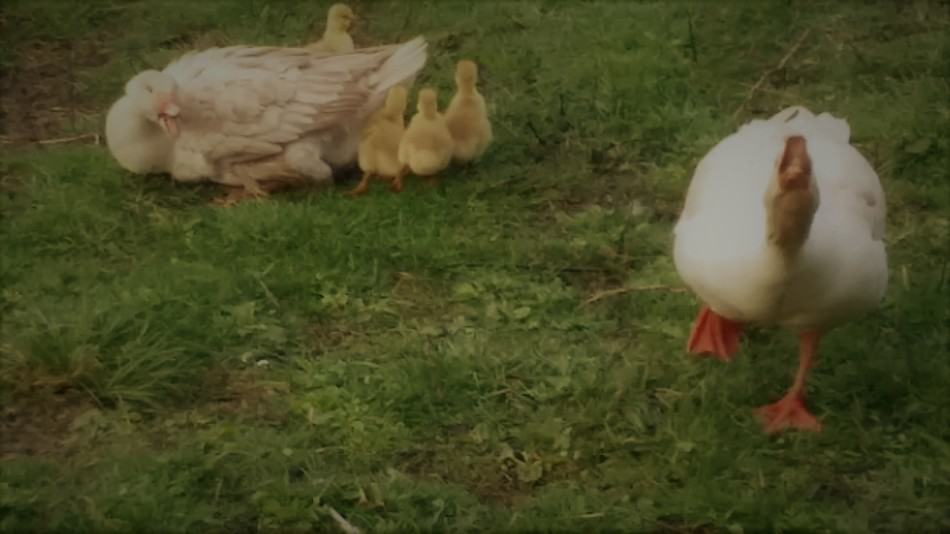
The babies are darling and I get a huge kick out of seeing them every spring, the parents, who are fine without babies, are not so darling once the goslings hatch! Make sure you give your geese space when they have goslings! To be clear: these geese are not “mean”, they are being good parents by protecting their babies!
You have options when purchasing your geese
Order goslings: Ordering goslings from a hatchery is going to be the most common way to get started with geese. Just like chickens, ordering babies is not low maintenance!
The adults are easy care and very low maintenance the goslings need you until they are full size.
Buying adult geese: Buying adults geese will get you low maintenance birds right off the bat and you’ll be able to see exactly how they look, not have to guess how they will turn out, like when you purchase goslings.
Adult geese will cost you more per bird and are not commonly shipped, so you’ll need to pick up your geese within a reasonable driving distance for you.
Geese will transport just fine in your vehicle a larger dog carrier, if you have or can borrow one.
Word to the wise: make sure the fabric in the vehicle is well covered, on all sides of the cage!
Poultry Keeper is a great poultry site based in Herefordshire, U.K. They have articles on all manner of poultry and I find them especially useful for information on geese.
Bees as a low maintenance animal
I know not everyone would consider bees to be a farm animal, but I do! And for the vast majority of the year they are incredibly easy to care for, since they get along just fine without you!
You will need to occasionally put on extra boxes, called supers, and honey extraction hopefully needs to happen at the end of the summer, but other than that bees are easy keepers.
I need to mention with all of the bee death problems happening, many beekeepers are just buying package bees, in a group called a nuc (a starter group of bees) in the spring and planning on the hive dying out over winter.
Using this bees as a temporary animal plan is not ideal, but until bees stop getting picked off by pesticides and creepy genetically modified crops this may be your only answer.
Getting help from other beekeepers
A bonus regarding beekeeping as more of a hands off enterprise is that you can get other people to do it for you.
Around here, there are people who will uncap your honey and spin it out for you. With this arrangement, they keep some of the honey as payment.
In our area, an Amish beekeeper/farmer offers this service and it makes sense.
He has the uncapping knife and the extractor all set up and not making him any money outside of the few days he uses it for his own honey.
Offering to uncap your honey gets him some extra money using equipment and time that he already has available.
Another option would be to get a beekeeper to have a hive or two on your property.
The beauty of this system is that the beekeeper would do all of the bee care and you would get a share of the honey.
There are beekeepers that rent you a hive and the deal goes something like this: they bring and set up the hive, you watch the care and get part of the honey produced from your hive. This is all done for a fee.
Around here, it is more common for a person to let the beekeeper use a small section of land, usually a fence row or the edge of a garden.
The beekeeper cares for and monitors the bees and gives the land owner some of the honey as payment, no money is exchanged.
Nothing wrong with raising bees on your own, I mention the bee rental system or working with another bee enthusiast as options that would be very low maintenance yet get results.
You’ll need some special equipment for bees
If you do the work with bees yourself, there’s not much to do but there is some, you’ll need a suit at the very least.
Also, you may need to get more supers (stackable boxes) for the hive.
All of the equipment is easy to order online.
The bees themselves can easily be purchased as well, just search around at bit online for the place closest to you that can order you in some bees. You will have to drive to the business to get the bees.
Grazers (Cattle or Sheep) are low maintenance
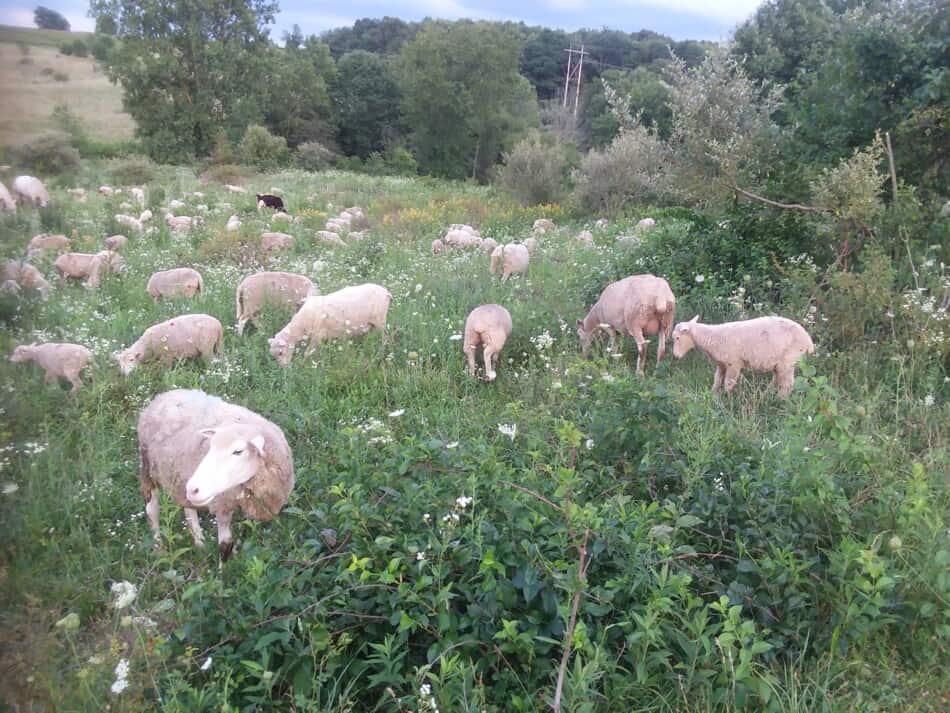
If you are fortunate enough to have a good amount of grazing land available to you ruminants like cattle or sheep can be very low maintenance.
If you do not have much land available, you are going to have quite a bit of time into your herd feeding them hay when the grass is all eaten, meaning grazers are only low maintenance if you have plenty of grass!
I need to mention two things here: pasture divisions and easy care livestock.
You will get far more growth from your pasture if you plan your grazing and rotate your stock through a series of pasture divisions.
Obviously, this will add time to your day, (so it’s no longer low maintenance) to make the pasture moves but it will save you money with huge increases in grass growth.
Get easy care breeds and genetics when you buy livestock
The second qualifier here is easy care stock. You need to have animals that do not need you to look after them.
Get stock that has been raised in the way you want to raise them once you get them to your place.
How To Find The Right Breed Of Sheep For You will go over what you should be looking for when purchasing sheep.
An example of a higher maintenance sheep: a breed of sheep that needs supplemental feed to grow well and/or has multiple births frequently.
This type or breed of sheep (could be either) will need more care than a hardier breed or cross breed that is more self sufficient.
This isn’t a problem, it’s just not a recipe for a low maintenance animal.
Maybe you’re more interested in cattle? Choosing Your Starter Herd will show you what to look for and what to avoid.
Generally speaking, if the stock you have has multiple births and/or really high weaning weights it is not a low maintenance animal.
Nothing wrong with high weaning weights or multiple births, however, both take more energy to maintain and require monitoring to make sure your stock are getting what they need.
Expect the animals to take longer to grow
Be aware that low maintenance animals will not perform as well as some higher maintenance animals, in terms of growth for a certain time period.
This only makes sense! Fast growth will require extra work from you!
For example: if you have feeder cattle that you provide supplemental grain to, along with their pasture, they will grow faster than if they didn’t have the grain.
But providing the grain gives you more work to do (no longer low maintenance) and will increase your likelihood of health problems in the cattle another way to suck your time, not to mention your money!
A caution here: do not confuse slower growing with poor results, not at all!
Some of the best results you can get with ruminants are from a bit slower growth, due to feeding grass only.
The trade off is healthier animals and much healthier meat, but it does take longer.
Babies will up your workload
This section is not specific to cattle or sheep, the rules apply to both.
Keep in mind that as soon as you get moms having babies, your work will increase, (no longer low maintenance) at least until the babies are up and really growing.
If you decide to get your cattle or sheep reproducing, realize you will no longer have a low maintenance herd or flock for the whole year.
Even easy care animals that don’t need you to attend the birth of the baby, still need you to watch them more closely to make sure they are getting everything they need and make sure that the babies are growing well.
You have options for buying your grazers
Buying adults: Starting with high quality adult cattle or sheep is your best choice for having a happy and healthy herd/flock.
Adults will take less care and attention than younger stock.
Buying feeders: Feeders are weaned lambs or calves that you would buy to grow out on your farm.
They will not be as care free as adults, but they will cost less per head and you will not have to deal with breeding seasons and births.
As mentioned above, if you choose to supplement the grass with grain, you will no longer have a low maintenance animal. They will grow faster, but will require more work from you.
Reminder: sheep and cattle are ruminants, they do not need grain.
I mention it for anyone with a small amount of available grazing land, grain allows you to supplement the calories from the grass for your grazer.
Meaning using a bit of grain will allow you to raise a calf or a few sheep on an area that would have otherwise been too small, if you relied on grass alone.
